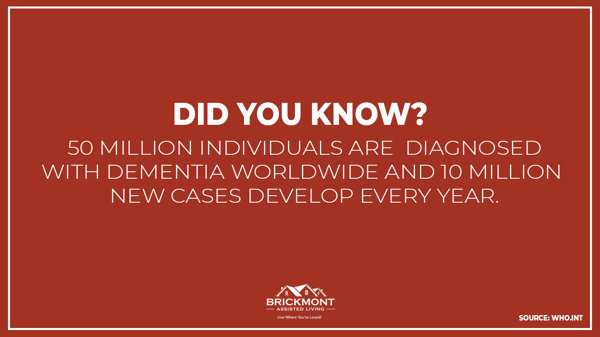
Dementia is a term used to describe a variety of symptoms that affect a person’s cognitive function, which can impact their ability to communicate, think, reason, remember, and more.
While Alzheimer’s disease may be the most common form of dementia, there are many other types or forms of the condition.

With the condition becoming more commonplace, it is pertinent that people understand and recognize the early signs of dementia. Brickmont Assisted Living wants to raise awareness regarding dementia and help families better understand and identify early signs. While warning signs can vary, if you notice one or more of the following symptoms in a parent or loved one, we recommend discussing your concerns with a healthcare professional.
1. Memory Loss
Memory loss is the most common symptom of dementia. This change is subtle, though, and typically affects short-term memory before long-term memory, especially during the early stages of the condition.
Memory loss can be particularly challenging to pinpoint because while your loved one may not remember what they did that day, they may have very detailed memories regarding a past event. This can bring reassurance and make a family member overlook a deeper issue.
Many people with dementia, early-set or not, can experience the following memory impairments:
- Forgetting recent events or conversations
- Difficulty in finding the right words or names during a conversation
- Losing or misplacing important items
- Recognizing familiar faces
As dementia continues to develop, these symptoms may become worse and/or happen more often.

2. Struggling with Familiar Tasks
Another early sign of dementia can be struggling with familiar tasks. These tasks can vary from operating a television to making a cup of tea. An individual with dementia may forget or have trouble with tasks they would usually complete every day.
3. Apathy
Apathy is a loss of interest or motivation in things that would typically spark interest or emotion in a person. While a small percentage of older adults may have apathy, it is very prevalent in those with dementia, impacting 50%-70% of those diagnosed.
While apathy may seem similar to depression, it has different signs and symptoms:
- Lack of effort or energy to complete daily tasks
- Loss of interest or curiosity
- Lack of care in problems that concern themselves and others
- Seeming indifferent or detached towards personal news or events
4. Getting Lost or Confused
Getting lost or confused in normal settings can be another early sign of dementia. Confusion, at times, is normal, but frequently getting lost in a familiar environment, like one’s home or around their neighborhood, may be an early indication of dementia in an individual.
5. Changes in Behavior
One of the most common early signs of dementia is a change in behaviors. This can include aggression, repetitive behavior, sleep disturbances, hiding or hoarding things, and paranoia. It can vary from person to person, but typically, they become uninhibited and act in strange ways that are unlike their usual actions or behavior. Becoming uninhibited is like losing your social filter. Instead of thinking about what is said or done, you act or say it without concern for those around you.
6. DIFFICULTy Writing or Speaking
Dementia can make it difficult for a person to speak, write, or even read. They may not be able to find the right word and may substitute it for something else. It can also affect their understanding of language and communication, which may prompt an abnormal response to something said to them.
Difficulty with language may be the first demonstrated symptom for some forms of dementia, like frontotemporal dementia.
Dementia impacts people differently, so early signs of dementia can vary. If you believe a parent or loved one is demonstrating these or similar symptoms, it is best to seek the opinion of a medical professional. The earlier a diagnosis is made, the more effective treatment can be. With an early diagnosis, care providers can mold an optimal and effective care plan around them.
Though there is no cure at this time, discovering the disease and beginning treatment can help hinder the progress of the disease. Memory care and dementia care services, like those provided at Brickmont Assisted Living, offer a person with dementia compassionate care from professionally trained team members. Our dementia care seeks to provide meaningful experiences to residents in a safe and welcoming environment.
With communities in Milton, Woodstock, and Acworth, Georgia, Brickmont Assisted Living’s memory care services, called “Silver Linings,” offer comfort and security in a specially-designed neighborhood. Silver Linings creates an intimate environment with natural lighting, great food, music, art, and friendly faces that ensure our residents can find contentment and meaning in every new day.
To learn more about Brickmont Assisted Living’s “Silver Linings” memory care, we encourage you to contact our Brickmont team.




.png)